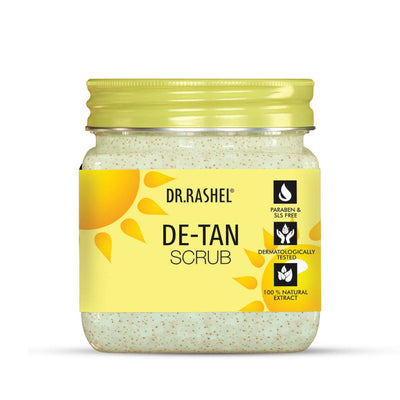
Table of Contents
- Why Washing Your Face Matters?
- How Many Times Should You Wash Your Face in a Day?
- What Happens If You Wash Too Often?
- How Often Should You Wash Based on Your Skin Type?
- Final Note
- FAQs: How Many Times Should You Wash Your Face
Some people believe washing more often keeps the skin cleaner and prevents acne. Others say washing too often damages the skin barrier and causes dryness. The truth? Both can be right - depending on how and how often you wash your face.
Your face encounters pollution, oil, dust, and bacteria daily. Washing helps remove these, but overdoing it can harm your skin’s natural balance. The key is finding a rhythm that keeps your skin clean, healthy, and hydrated - not stripped or stressed.
Let’s understand the science behind face washing, how often to do it, and how to tailor it for your skin type and lifestyle.
Why Washing Your Face Matters?
Cleansing is the foundation of every good skincare routine. It’s the first step - the reset button - that clears away impurities so your skin can breathe and absorb products better.
- Removes dirt, oil, and sweat: Cleansing clears away the daily buildup that clogs pores and leads to acne or dullness.
- Removes pollution and sunscreen: Your face collects micro-particles throughout the day that can irritate or age the skin.
- Prepares your skin: Clean skin allows toners, serums, and moisturisers to penetrate effectively.
- Maintains pH balance: A proper face wash restores your skin’s natural pH (~5.5), which keeps bacteria under control and your barrier strong.
How Many Times Should You Wash Your Face in a Day?
Dermatologists agree that twice a day is the golden rule - once in the morning and once before bed.
Morning wash: Removes oil, sweat, and bacteria that accumulate overnight while your skin regenerates. It also preps your face for your morning skincare routine and sunscreen.
Night wash: This one is non-negotiable. It removes makeup, sunscreen, sebum, pollution, and impurities from the day, preventing clogged pores and dullness.
If your skin gets sweaty or you’ve been exposed to dust (like after a workout or commute), a gentle mid-day rinse or micellar cleanse is fine - but limit full cleansing to twice daily unless needed.
What Happens If You Wash Too Often?
More washing doesn’t mean cleaner skin - in fact, it can do the opposite.
Overwashing strips away your skin’s natural oils (sebum) and weakens the protective barrier, leading to dryness, irritation, and even more oil production as your skin tries to compensate.
Signs you’re overwashing:
- Tightness or dryness after washing
- Flaky patches
- Redness or stinging
- Oily shine a few hours later (your skin’s way of “overcorrecting”)
Your skin needs a balance between cleansing and hydration. Too much washing upsets that balance - leaving it more vulnerable to pollution, UV damage, and aging.
How Often Should You Wash Based on Your Skin Type?
- Oily Skin - Oily skin produces excess sebum that can clog pores and attract bacteria. Wash your face twice a day - morning and night - using a mild, non-comedogenic cleanser.
- Dry Skin - Dry skin lacks natural oils, so overwashing can worsen flakiness or irritation. Cleansing once or twice a day is enough.
- Combination Skin - Combination skin needs balance - cleansing too much can dry the cheeks while leaving the T-zone oily.
- Sensitive Skin - Sensitive skin should be treated gently. Wash once daily (preferably at night) with a mild, fragrance-free cleanser to avoid irritation.
- Acne-Prone Skin - Acne-prone skin benefits from consistent but gentle cleansing. Wash twice a day using non-drying formulas that remove excess oil and bacteria without disrupting the skin barrier.
Final Note
Cleansing isn’t about doing more - it’s about doing it right. Washing your face twice a day is ideal for most skin types, but the right frequency depends on your skin’s natural rhythm and environment.
Remember: clean doesn’t mean tight or dry. If your skin feels fresh, hydrated, and comfortable after washing, you’ve found your balance.
FAQs: How Many Times Should You Wash Your Face
How frequently should you wash your face?
Most dermatologists recommend washing your face twice a day - once in the morning and once at night. This keeps away oil, dirt, and pollution buildup while protecting your skin’s natural barrier. Over-washing can lead to dryness, while under-washing can cause clogged pores and breakouts.
How do I know if I am overwashing my face?
If your skin feels tight, dry, itchy, or starts flaking after washing, you may be overwashing. Other signs include redness, burning, or sudden oiliness (your skin producing more oil to compensate). Healthy skin should feel clean, soft, and comfortable - never stretched or rough.
Can I wash my face 7 times a day?
No - washing your face seven times a day is excessive and harmful. It strips away natural oils, weakens the skin barrier, and causes irritation. If your skin feels sweaty during the day, rinse gently with plain water or use a soft tissue or blotting paper instead.
Is it good to wash your face three times a day?
Washing your face three times a day isn’t usually necessary. Twice is enough for most people - morning and evening. A third cleanse should only be done after heavy sweating, workouts, or pollution exposure, and it should be gentle and hydrating.
Why is my face still dirty after cleansing?
If your face still feels oily or dull after cleansing, your face wash might be too mild, or you may not be washing long enough. Massage your cleanser for at least 30–60 seconds to dissolve sunscreen, makeup, and pollutants. Always rinse thoroughly and use lukewarm water - not hot or cold.
How much face wash is enough?
A pea-sized or coin-sized amount is usually sufficient. Using more doesn’t make your face cleaner - it only wastes product and can over-dry the skin. The key is to lather it well between your palms before applying, so it spreads evenly and cleans gently.
Is it ok to wash your face with soap?
Regular body soaps are not suitable for facial skin. They’re alkaline and can disrupt your skin’s natural pH, causing dryness, irritation, and tightness. Always use a pH-balanced face cleanser designed specifically for the face to maintain healthy skin.
Why does my face feel tight after washing?
A tight feeling means your cleanser is too harsh or you’re overwashing. The skin’s natural oils have been stripped away, leaving it dehydrated. Switch to a gentle, hydrating cleanser and always follow up with a moisturiser to restore comfort and softness.
Can I wash my face with just water?
If you’re not wearing makeup or sunscreen, rinsing with plain water in the morning is fine - especially for dry or sensitive skin. However, at night, you need a proper face wash to remove oil, dirt, and sunscreen that water alone can’t dissolve.
Is washing your face for 30 seconds enough?
Yes, 30–60 seconds is ideal. It gives your cleanser enough time to lift dirt and oil without overworking your skin. Spending too little time won’t clean properly, while washing for too long can irritate or dry your face.
How do I know if my face wash isn't working?
If your skin feels tight, overly oily soon after washing, or you notice breakouts, dullness, or residue, your cleanser may not suit your skin type. A good face wash should leave your skin feeling clean, balanced, and comfortable - not stripped or sticky.
Should you moisturize after washing your face at night?
Cleansing removes impurities but also some natural oils. Moisturising afterward replenishes hydration, repairs the skin barrier, and helps your skin recover overnight. This is one of the most important steps in any nighttime skincare routine.
Can I use moisturizer without a cleanser?
While moisturising is essential, skipping cleansing can trap dirt and bacteria under the cream, leading to clogged pores or breakouts. Always cleanse before applying moisturiser - even if it’s just with water in the morning. Clean skin helps your products absorb better and work effectively.







